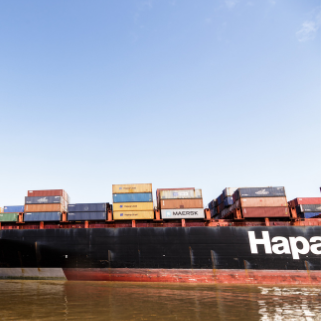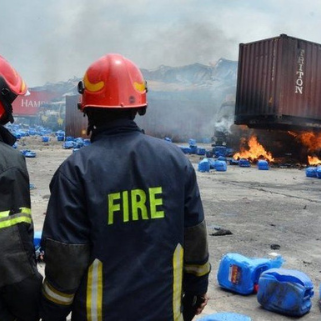Tragedy in Bangladesh
A fire which broke out on Saturday in a shipping container quickly turned into a colossal tragedy, one which unfortunately is not an isolated event.
The container exploded as firefighters were trying to extinguish the blaze. At least 49 people were killed, hundreds more were wounded and many are still missing in Sitakunda, Bangladesh.
The fire was supposedly caused by chemicals in the container. Explosions continued through the container yard as the firefighters worked to battle the blaze. The army was called in to help prevent chemicals from flowing into the Indian Ocean.
"The explosion just threw me some 10 meters (32 feet) from where I was standing. My hands and legs are burnt," lorry driver Tofael Ahmed told AFP news agency.
The blast was felt from up to 25 miles away. Debris went flying everywhere breaking windows nearby, a sight described as "fireballs falling like rain."
Cause for Change
Bangladesh has managed to become the world's second largest exporter of garments. This container depot alone contained millions of dollars worth of garments set to be exported to western retailers.
Industrial fires happen frequently due to poorly enforced and ignored safety regulations. Fires, building collapses and chemical leaks are just some of the 12 major disasters reported since 2005.
Our hearts are with all those affected.
Source: BBC
Calls for Intervention
Us importers sent an urgent letter to the Biden administration requesting they step in.
Why, you ask?
Since May 10, the International Longshore and Warehouse Union (ILWU) and the Pacific Maritime Association (PMA) have been renegotiating dock workers contracts which expire on July 1. Things got a bit tough there and the sides mutually agreed to a 10 day break.
Importers are getting (rightfully) nervous by the lack of progress.
“We urge you to encourage both parties to remain at the table until an agreement is finalized because even a relatively brief port slowdown or shutdown would compound current supply chain challenges and cause long-lasting damage to consumer confidence and American businesses,” they wrote.
Although the Biden administration has already met with the ILWU and the PMA to try and get things moving, the importers want more action taken
Opportunity Strikes
The group of importers also want the contract renewal to be used as an opportunity to make positive and necessary changes such as systemic operational challenges, infrastructure modernization, and transparency into data sharing and end-to-end visibility.
Are they dreaming in technicolor?
Probably…
Source: JOC

Finally Fined
The US Department of the Treasury will be receiving $2 million after a settlement between the Federal Maritime Commission (FMC) and Hapag-Lloyd was approved.
The ocean carrier will pay a civil penalty for their unjust detention and demurrage practices.
“To restore full confidence in our ocean freight system, vigorous enforcement of FMC rules is necessary. Specifically, we must ensure powerful ocean carriers obey the Shipping Act when dealing with American importers and exporters. The case that was concluded today is just part of an ongoing effort to investigate any conduct alleged to violate FMC rules – and in particular, the interpretive rule on detention and demurrage charges,” Chairman Daniel Maffei said.
Will this deter other ocean carriers from such practices?
Only time will tell!
Source: AJOT
Fact Finding Investigation
Back in March 2020, the Federal Maritime Commission (FMC) ordered Fact Finding 29 to investigate COVID-19 induced congestion and bottlenecks at ports and other points in the supply chain that posed a serious risk to the U.S. economy. The investigation involved hundreds of supply chain stakeholders, including U.S. importers, exporters, truckers, and others participating through virtual meetings, phone conversations, emails, and presentations to various groups.
On Tuesday, FMC Commissioner Rebecca Dye released her long-awaited final report to the public.
Dye attributes the rising freight rates to unusually strong demand from U.S. consumers, COVID-19, and congestion in the supply chain—not a lack of competition.
Charged
Commissioner Dye found that there were some concerning detention and demurrage practices amongst ocean carriers which aren’t in full compliance with the “incentive principle” of the FMC’s Interpretive Rule on Demurrage and Detention.
“Exemption” from Antitrust Laws
Another area Commissioner Dye looked at was shipping alliances’ alleged “exemption” from antitrust laws under the Shipping Act of 1984. However, according to Dye, this “exemption” is actually an “alternative competition regime,” put in place by Congress and administered and monitored by the FMC.
“During the pandemic, ‘blank sailing’ was a particular concern because of their potential to be used for anti-competitor purposes. Our monitoring, however, indicated that this reduced service by ocean carriers was driven by port congestion rather than a desire to reduce capacity, and delays and skipped ports have been a frequent occurrence,” Dye said in her report.
Moving Forward
In her final report, Commissioner Dye issued 12 new recommendations that she believes the industry would benefit from. They include:
- A new Commission “International Ocean Shipping Supply Chain Program”;
- A rulemaking to provide coherence and clarity on Empty Container Return practices;
- A rulemaking to provide coherence and clarity on Earliest Return Date practices;
- Continued Commission support for the new FMC “Ocean Carrier Compliance Program” including a new requirement for ocean common carriers, seaports, and marine terminals to employ an FMC Compliance Officer;
- An FMC Outreach Initiative to provide more information to the shipping public about FMC competition enforcement, service contracts, forecasting, and shippers associations, among other topics;
- Enhanced cooperation with the federal agency most experienced in agricultural export promotion, the Department of Agriculture, concerning container availability and other issues;
- A Commission Investigation into practices relating to the numerous charges assessed by ocean common carriers and seaports and marine terminals through tariffs;
- A rulemaking to provide coherence and clarity on merchant haulage and carrier haulage;
- A new “National Seaport, Marine Terminal, and Ocean Carrier Advisory Committee” to work cooperatively with the Commission’s National Shipper Advisory Committee;
- A revival of the Export Rapid Response Team program as agreed by all ocean carrier alliance CEOs;
- An FMC Supply Chain Innovation Teams engagement to discuss blank sailing coordination and information availability; and
- A reinvigorated focus on the extreme supply chain equipment dislocations in Memphis railheads, other rail facilities, and other facilities around the country.
The Fact Finding Officer is also concerned that the Commission lacks the regulatory tools to deal with the numerous new charges imposed on U.S. shippers and truckers by ocean carriers and marine terminals through tariffs and with other supply chain dislocations within the Commission's authority. Several final recommendations by the Fact Finding Officer address these concerns.
Finally, based on the information gathered, the Fact Finding Officer further believes that the most productive path forward for shippers and ocean carriers alike would be to enter mutually enforceable and binding service contracts — true “meeting of the minds” — that are enforceable commercial documents. For some time, the Fact Finding Officer has been concerned that the contracts negotiated by many U.S. importers and exporters lack this mutuality of understanding and obligation and are not enforceable. Without enforceable contracts, shippers are unable to protect themselves from volatile shipping rates and ocean carriers have few forecasting tools to provide the shipping capacity necessary to serve their customers.
Source: gCaptain




